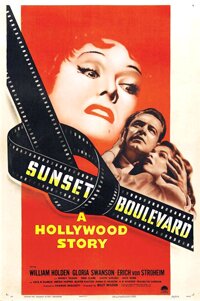 Directed by Billy Wilder
Directed by Billy Wilder
We didn’t need dialogue. We had faces!
– Nora Desmond –
One of the best movies to ever come out of Hollywood is 1950’s Sunset Boulevard, a movie about Hollywood. It’s a kind of anodyne for the glamorous mystique of the movie business.
Interestingly, it takes core elements of Hollywood, romance and a degree of sentimentality, and by turning them inside out, creates a film noir – cynical and dark yet just as romantic.
A struggling Hollywood writer (William Holden) is hard up for money, hiding from bill collectors and trying to hang on to what little he has, particularly his car.
He hides out in run down looking mansion where he meets an aging silent film star (Gloria Swanson). He finds himself drawn into her world, one that’s fantastic and tinged by an element of madness.
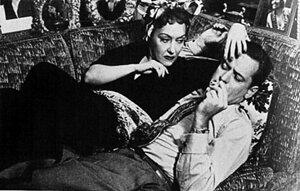
There are twin seductions occurring here: she is seduced by his youth and good looks, as well as by the thought that he might hold the key for her comeback.
He, in turn, is seduced by the respite staying with her allows him, as well as the wealth he has access to by staying with her. In a sense, they corrupt one another, although both are well on the way already.
Eventually Holden winds up playing the part of gigolo as he helps her with a terrible screenplay (which she believes will re-establish her as Hollywood’s premier star). She, in turn, provides for him – a place to live, clothing, gifts and so on.
But everything is twisted, including Holden’s talent as a writer and his essential character.
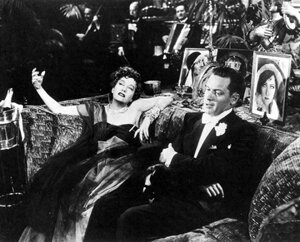
By compromising to get by, he compromises his better self and, even when he begins working secretly on a script worthy of his talents, that also becomes tainted by his moral lassitude.
It’s a movie about Hollywood’s compromises and the essential deception between what is presented on screen and the manner in which films are made. In other words, there is a moral disparity between public display and private actions.
From the start, in his opening voice over, Holden’s character is cynical. There is humour here, and throughout the film, but it is dark and bitter. But even from the story’s beginning we see what has happened to Holden in terms of moral compromise.
There is an early scene where a script of his is turned down, briskly brushed off as lame by an efficient, attractive script-reader (Nancy Olson). But from the scene, through Holden’s words and action, we know why the script is turned down – it isn’t true. It’s compromised writing.
It is the script of someone writing what he thinks someone else wants to hear rather than what is true to him as a writer.
His talent, like his character, is degrading beneath his desire to succeed at any cost.
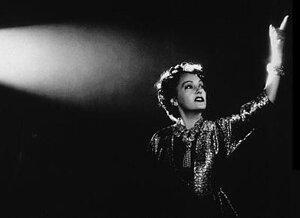
From the humour he uses, you also know that he is aware of this on one level but casually dismissive of it on the surface.
He doesn’t want to face what he knows is happening to himself, so he hides it beneath cynical wise-cracks.
In the character of Swanson, we see what is likely the result of Hollywood’s culture of compromise and pursuit of success – the dismissed artist dissolving into madness.
It’s a brilliant film, one of the best noir pieces ever, one of the best movies ever. It somehow manages to balance a number of elements – mystery, romance, humour and horror.
The movie also takes the interesting approach of basically telling us the ending at the beginning.
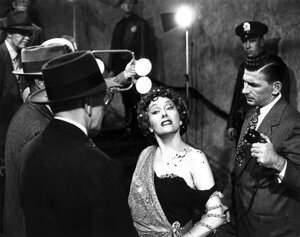
The film is thus not so much about what happens as it is why it happens. It’s the “why” that holds the film’s critique of Hollywood and, more broadly, the desire to succeed.
With the DVD, we get a great transfer – the movie looks great. There are also a number of excellent features on the disc, a nice plus for an older movie. (With many older films all we get are trailers.)
If you haven’t ever seen Sunset Boulevard, what are you waiting for? It is one of the great films and, now, it’s available on a great DVD. (Refers to the 2002 Special Collector’s Edition.)



2 Responses